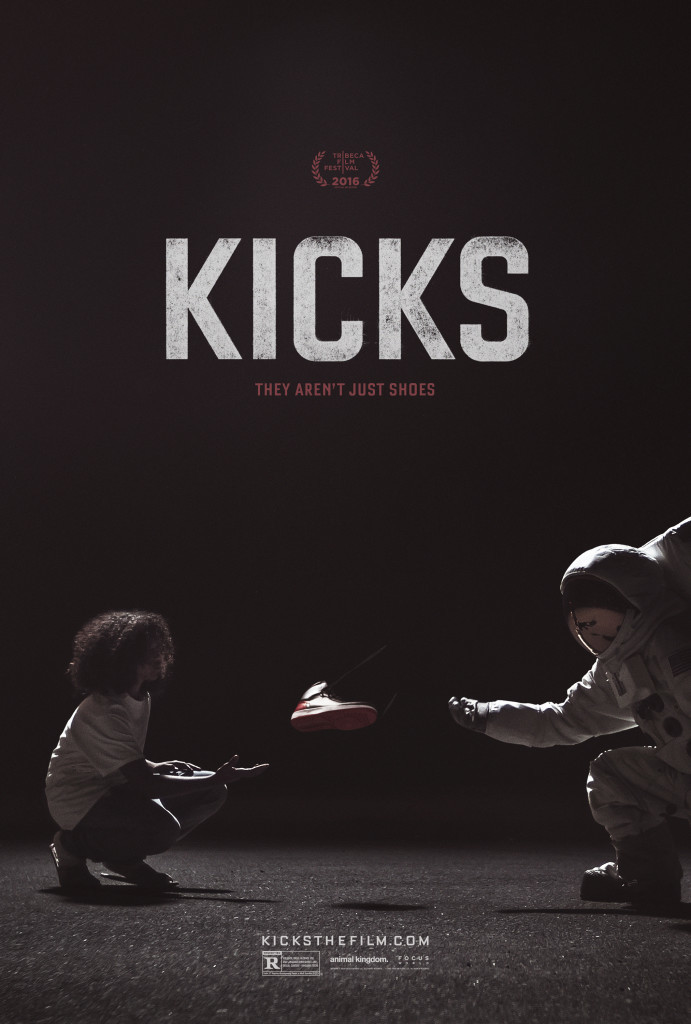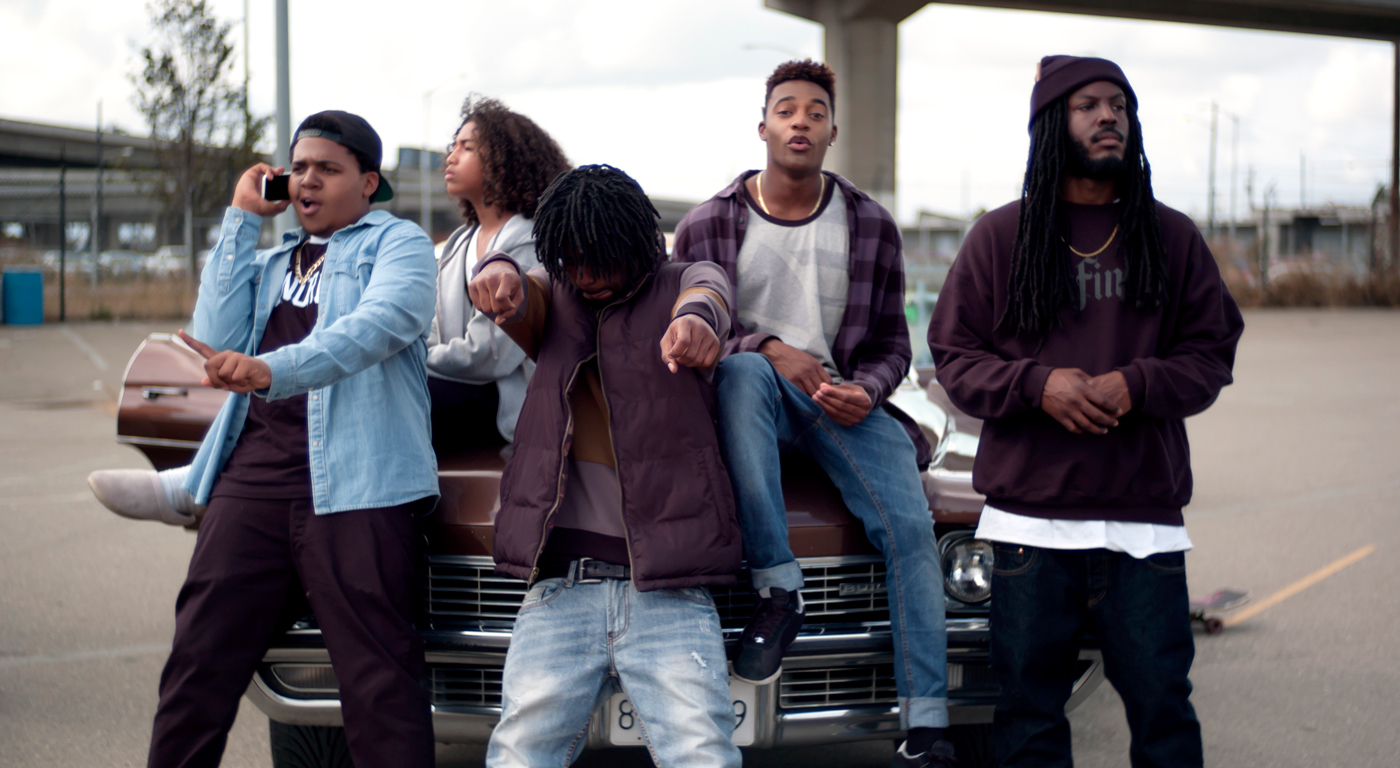When Justin Tipping was growing up in the Bay Area, he got the living shit beaten out of him over a pair of custom Nike Prestos. “I was alone in a parking lot at a movie theater that doesn’t exist anymore in West Oakland. I had just got my shoes, borrowed my dad’s car, and thought I was on the top of the world.” Until a group of kids pulled up and began closing in. “When one of them shouted, ‘He’s got the Prestos!’ I realized, ‘Oh shit, this is not gonna end well.'” That violent assault became the springboard for Kicks, the director’s feature-length debut that made its world premiere as the opening film on the US Narrative Competition slate at the Tribeca Film Festival.
Kicks follows 15-year-old Brandon (played by breakout 13-year-old newcomer Jahking Guillory), a shy skater whose low height and lower socioeconomic status make growing up in Oakland a serious struggle. Though his two best friends are supportive, always standing toe-to-toe with their fresh pairs of Jordans doesn’t exactly help Brandon’s confidence. But when a mysterious hood fairy godmother rocks up with a mini van full of Js, Brandon sets his sights on a pair of OG 1s and works tirelessly to cop ’em. Once he does, life changes — he walks taller, girls actually approach him, and he’s treated with respect by his pals and peers — until he gets jacked by a crew with fast cars and big guns. But Brandon refuses to return to his powerless life and its busted sneakers, so he embarks on a quest to steal back his Jordans at any cost.
Though Kicks is a remarkably authentic coming-of-age story that balances aggression with tender camaraderie — teen bedroom braggadocio with total sexual ignorance — it isn’t a light-hearted revenge romp. It’s a reflection on the nature of power: how it’s constructed through intersections of masculinity and materialism, how it’s wielded through violence, and how communities governed by its exertion are often the least powerful of all. We caught up with Tipping to learn more.

What drove you to tell this story?
The emotional impetus came from the time I got jumped over a pair of Nikes. Looking back on that period of time and specific moment in my life — my humiliation, my brother assuring me, “it’s alright, you’re a man now” — led me to question how we define masculinity and why violence is perpetuated. So it was personal and I was passionate about it, but I also wanted to say something meaningful to start a discussion about those bigger issues. I want to tell stories that aren’t usually shared, about people that you wouldn’t necessarily get to see on screen.
Let’s talk about casting, then. Your story felt so authentic because of the people telling it.
I knew I wanted to work with both actors and non-actors from the beginning, so we went on a massive search. We had a casting director in LA and SF seeing hundreds of kids; I moved back home with my parents and was street casting constantly. We posted flyers and held open calls everywhere, we hit up every youth center and after school arts program, like Youth UpRising in East Oakland. We’d go there and set up a camera for any kid that wanted to audition.
We ended up getting the three main characters through Kim Hardin, a casting director who’s worked on films like Hustle and Flow. Mahershala Ali [House of Cards, The Hunger Games] plays Brandon’s uncle Marlon; he heard about the script and we really clicked because he’s also from the Bay, so he really understood. Everyone else in the film is literally someone from the neighborhoods we shot in.
What was the collaborative process like working with these non-actors? The dialogue felt almost documentary.
There are definitely scripted elements to the story, but I’d approach each scene with the kids like: this what it says on paper, this is your intention, this is the sentiment, but just say it how you want to say it. You just need to own their authenticity, let them put the nuances that can’t be pretended in there. There were some moments where I had to encourage them to let it all out together, like an orchestra.
That’s a good analogy, because music plays such an important role in this film. The action is broken up with title cards featuring hip-hop songs, and Brandon’s inner monologue is lifted from lyrics.
I’ve always wanted to make this a music movie. Music is such an important part of life, but especially I think when you’re a teenager. It leaves impressions with you; you obsessively want more. That’s kind of where Brandon rapping Biggie Smalls’ “Party and Bullshit” in his head came from. The rest of the voiceover raps in the film are original — one of the kids we cast is a poet and spoken word artist, so we asked him to write and perform stuff. Initially, I wanted to use a sample of rap quotes to be kind of these breakbeats in the action, but obviously couldn’t afford to use them, so I incorporated chapter markers instead.
Some of them are more universal, like Jay-Z, others are really specific to the Bay Area, like Mac Dre.
I’d written in Mac Dre from the beginning. He’s a legend and an icon in the Bay — he was such an influence in igniting the hyphy movement. So to me, the scene where “Get Stupid” is playing at the side show as Flaco’s young son Jeremiah is watching everyone go wild, was an interesting juxtaposition. “Get Stupid” is great and it’s fun — I love that song so much — but sometimes, we can’t just act the way we do in front of kids.
Just like this film, music reflects and confronts the issues present in the communities in which it was created. There are also powerful gender dynamics at play in hip-hop. How did you approach the representation of women in the film?
At points it was difficult to put aside my personal views, but I really wanted the film to be honest about the reality of those teenagers’ lives. It’s written from the point of view of a 15-year-old boy.
There’s such a great moment when Albert is explaining why he needs XL condoms — because the “normal size” cuts off circulation to his balls — and Rico just shouts “you don’t put a condom over your balls!” He doesn’t even try to backpedal, he just keeps on running his mouth.
Exactly, all they do is talk about girls even though they’ve never actually been with one, so there’s already a skewed lens. But I actively encouraged every girl who was in the scenes to act just like the boys. I wanted them to always speak back and not take any shit from the male characters no matter what the scene was about — always have the last word. And though I actively chose not to have any adults in the movie, I do think Brandon’s mother [who never appears on screen] is a character. She’s a loving one who just can’t be there, which is the reality for a lot of kids — there’s a high cost of being poor, and those are the effects. He’s left alone, but it’s not because she’s a bad mother, in fact, she’s a great mother. And she does play a strong role in the film; you’re learning about her through his interpretation of what’s going on, and you discover how she’s shaped his life and outlook.
What do you hope people take from this film?
At least some bittersweet sense of hope, that it can be okay. If you’re born in a culture in which you dominate or are dominated, no matter how hard you try to avoid violence, it will find you. But you can still make choices. In the end, Brandon doesn’t pull the trigger, Jeremiah doesn’t give his dad the gun. I hope it inspires discussion and thought, even if it’s just, “Hey, we should all have a talk about this.”
Credits
Text Emily Manning
Image courtesy Tribeca Film Festival
